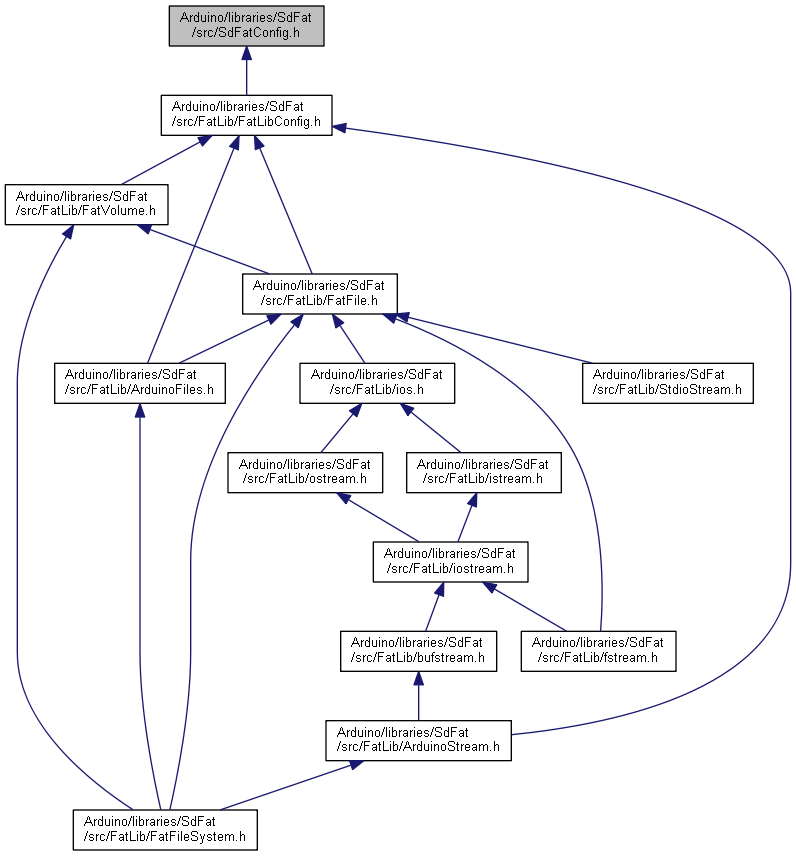|
SdFat
|
|
SdFat
|
configuration definitions More...
#include <stdint.h>

Macros | |
| #define | DESTRUCTOR_CLOSES_FILE 0 |
| #define | ENABLE_EXTENDED_TRANSFER_CLASS 0 |
| #define | ENABLE_SDIO_CLASS 0 |
| #define | ENABLE_SOFTWARE_SPI_CLASS 0 |
| #define | ENDL_CALLS_FLUSH 0 |
| #define | FAT12_SUPPORT 0 |
| #define | IMPLEMENT_SPI_PORT_SELECTION 0 |
| #define | MAINTAIN_FREE_CLUSTER_COUNT 0 |
| #define | SD_HAS_CUSTOM_SPI 0 |
| #define | USE_LONG_FILE_NAMES 1 |
| #define | USE_MULTI_BLOCK_IO 1 |
| #define | USE_SD_CRC 0 |
| #define | USE_SEPARATE_FAT_CACHE 0 |
| #define | USE_STANDARD_SPI_LIBRARY 0 |
| #define | WDT_YIELD_TIME_MICROS 0 |
configuration definitions
| #define DESTRUCTOR_CLOSES_FILE 0 |
Set DESTRUCTOR_CLOSES_FILE nonzero to close a file in its destructor.
Causes use of lots of heap in ARM.
| #define ENABLE_EXTENDED_TRANSFER_CLASS 0 |
If the symbol ENABLE_EXTENDED_TRANSFER_CLASS is nonzero, the class SdFatEX will be defined. If the symbol ENABLE_SOFTWARE_SPI_CLASS is also nonzero, the class SdFatSoftSpiEX will be defined.
These classes used extended multi-block SD I/O for better performance. the SPI bus may not be shared with other devices in this mode.
| #define ENABLE_SDIO_CLASS 0 |
Enable SDIO driver if available.
| #define ENABLE_SOFTWARE_SPI_CLASS 0 |
If the symbol ENABLE_SOFTWARE_SPI_CLASS is nonzero, the class SdFatSoftSpi will be defined. If ENABLE_EXTENDED_TRANSFER_CLASS is also nonzero, the class SdFatSoftSpiEX will be defined.
| #define ENDL_CALLS_FLUSH 0 |
Call flush for endl if ENDL_CALLS_FLUSH is nonzero
The standard for iostreams is to call flush. This is very costly for SdFat. Each call to flush causes 2048 bytes of I/O to the SD.
SdFat has a single 512 byte buffer for SD I/O so it must write the current data block to the SD, read the directory block from the SD, update the directory entry, write the directory block to the SD and read the data block back into the buffer.
The SD flash memory controller is not designed for this many rewrites so performance may be reduced by more than a factor of 100.
If ENDL_CALLS_FLUSH is zero, you must call flush and/or close to force all data to be written to the SD.
| #define FAT12_SUPPORT 0 |
Set FAT12_SUPPORT nonzero to enable use if FAT12 volumes. FAT12 has not been well tested and requires additional flash.
| #define IMPLEMENT_SPI_PORT_SELECTION 0 |
Check if API to select HW SPI port is needed.
| #define MAINTAIN_FREE_CLUSTER_COUNT 0 |
Set MAINTAIN_FREE_CLUSTER_COUNT nonzero to keep the count of free clusters updated. This will increase the speed of the freeClusterCount() call after the first call. Extra flash will be required.
| #define SD_HAS_CUSTOM_SPI 0 |
Determine the default SPI configuration.
| #define USE_LONG_FILE_NAMES 1 |
Set USE_LONG_FILE_NAMES nonzero to use long file names (LFN). Long File Name are limited to a maximum length of 255 characters.
This implementation allows 7-bit characters in the range 0X20 to 0X7E except the following characters are not allowed:
< (less than)
(greater than)
: (colon) " (double quote) / (forward slash) \ (backslash) | (vertical bar or pipe) ? (question mark)
| #define USE_MULTI_BLOCK_IO 1 |
Set USE_MULTI_BLOCK_IO nonzero to use multi-block SD read/write.
Don't use mult-block read/write on small AVR boards.
| #define USE_SD_CRC 0 |
To enable SD card CRC checking set USE_SD_CRC nonzero.
Set USE_SD_CRC to 1 to use a smaller CRC-CCITT function. This function is slower for AVR but may be fast for ARM and other processors.
Set USE_SD_CRC to 2 to used a larger table driven CRC-CCITT function. This function is faster for AVR but may be slower for ARM and other processors.
| #define USE_SEPARATE_FAT_CACHE 0 |
Set USE_SEPARATE_FAT_CACHE nonzero to use a second 512 byte cache for FAT table entries. This improves performance for large writes that are not a multiple of 512 bytes.
| #define USE_STANDARD_SPI_LIBRARY 0 |
| #define WDT_YIELD_TIME_MICROS 0 |
Handle Watchdog Timer for WiFi modules.
Yield will be called before accessing the SPI bus if it has been more than WDT_YIELD_TIME_MICROS microseconds since the last yield call by SdFat.
 1.8.10
1.8.10